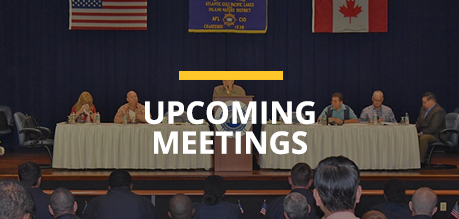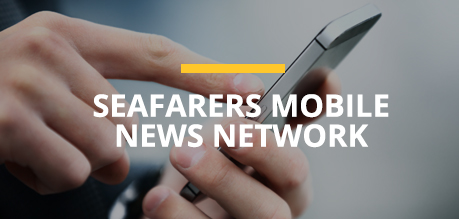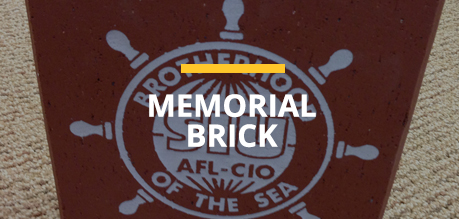Already know you’re ready to jump in? Visit MyMaritimeCareer.org for details or go straight to the application HERE
Everything you need to get started is on that site.
NOTE: You must be fully vaccinated against COVID-19 to attend classes at the Paul Hall Center for Maritime Training and Education, as well as to enter any SIU hiring hall (where such mandates are lawful.) For more information, contact your local hiring hall.
The application process is free of charge.
The Seafarers Harry Lundeberg School of Seamanship, part of the Paul Hall Center for Maritime Training and Education, is a vocational school dedicated to preparing students for successful careers as U.S. Merchant Mariners. The school’s apprentice program is registered with U.S. Department of Labor. There is no cost for tuition or room and board, though there are other costs associated with the program. Scroll down to the FAQ for more information.
If you previously have attended the apprentice program you are not eligible to apply and retake it.
Important Information for Applicants to the Apprentice Program and Applicants for SIU Membership
DRUG TESTING GOES WITH THE OCCUPATION
Employment in the U.S. maritime industry requires drug testing – not just initially but periodically throughout a mariner’s career. The testing, which is required by U.S. Coast Guard regulations, includes (but isn’t limited to):
- Marijuana – While legal in some states, it is still prohibited under federal law. CBD oil is also illegal under federal law, and may cause a positive drug test result for marijuana metabolites.
- Some prescription medications – Even though they’re lawful some may prohibit employment in the maritime industry. (Before stopping any prescription medication, check with your physician.)
- Any Department of Transportation-banned substance. More information is available at the following website: https://www.dco.uscg.mil/nmc/drug_testing/.
Drug Testing Requirements for Apprentices
If you are accepted into the apprentice program at the Seafarers Harry Lundeberg School of Seamanship, you must take and pass a Coast Guard approved pre-employment drug test immediately before beginning the training program. Before you return to the school for Phase III, you must take and pass a Coast Guard approved periodic drug test, unless you were subject to random drug testing on a ship for at least 60 days during the 185-day period prior to beginning Phase III. Once you complete the Apprentice Program, you will be subject to the drug testing requirements for mariners seeking employment at SIU-affiliated hiring halls.
Drug Testing Requirements for Mariners Seeking Employment at an SIU-affiliated Hiring Hall
If you are a mariner who is seeking employment for the first time at an SIU-affiliated hall, you must take and pass a USCG pre-employment drug test at a clinic approved by the Seafarers Health and Benefits Plan (SHBP) as a requirement to obtain a job. Once this drug test is on file with the SHBP, it is valid for six months. After that, you must take another pre-employment drug test to continue shipping, unless you were subject to random drug testing on a vessel for at least 60 days during the 185 days immediately before shipping out.
THE WORK CAN BE PHYSICALLY DEMANDING
If you have a medical issue that requires regular evaluation/monitoring, you should talk to your doctor to help you decide if you can work for several months at a time in a remote environment, without quick access to medical care.
New applicants are encouraged to consider the sometimes physically demanding nature of maritime work. No matter which division or department you sail in, these are not sedentary jobs.
For more information, check with the local Port Agent or call the SHBP Medical Department at (301) 994-0010, extension 5264. If you are applying to the apprentice program, you may also email Nurse Sharon at the SHBP Medical Department at [email protected] with medical questions.
The Process
Step #1
YOU HAVE 30 DAYS TO COMPLETE STEP #1, FROM THE DATE YOU SUBMIT YOUR APPLICATION
Please read all information about the Unlicensed Apprentice Program in its entirety prior to filling out the application. Fill out the electronic application online.
The online application includes the following:
- One ‘head shot’ photo of yourself.
- A copy of your DD-214 long form if applicable.
Once your application is received, you will be contacted via email within three to five working days (make sure you give a correct, active email address) and instructed to schedule a reading and math test at one of the SIU Halls. (If you have not heard from the school within seven days after you submit your application, it is your responsibility to follow up by calling 301-994-0010, Ext. 2)
Upon completion of Step #1, including testing and port interview, your application will be submitted to the selection committee. You will be contacted by email after completing Step #1 if you have been selected to move onto Step #2. Due to the economy and other conditions, the need for apprentices fluctuates throughout the year; therefore, the class sizes will vary depending on the number of mariners needed. At any time, the school reserves the right to not hold a selection committee. Any money spent (after being selected) as part of the application process is non-refundable and the sole responsibility of the applicant.
NOTE: YOU SHOULD NOT BEGIN STEP 2 UNTIL STEP 1 ITEMS HAVE BEEN COMPLETED AND YOU HAVE BEEN NOTIFIED OF BEING SELECTED
Step #2
You will be notified by email whether you are selected to continue on to Step #2 of the application process. At this time, you must provide copies of the following documents within 90 days or your application will be void. If you are unable to obtain the following documentation within the allotted time frame it is the applicant’s responsibility to advise Student Services of any issues.
- Obtain UA physical, drug test, and MSC shots through your SIU hall.
- Valid passport, and a copy of your Social Security Card.
- Transportation Worker Identification Credential (TWIC). A list TWIC centers and appointment scheduling can be found online at tsa.gov/for-industry/twic or by calling
1-855-347-8371. - As directed by Student Services, a receipt of payment from the U.S. Coast Guard for fees paid via Pay.gov (approximately $140). Contact Student Services for more information.
- All applicants must have a complete dental examination administered by his/her private dentist. A dental letter must be sent to the Admissions Office, on your dentist’s letterhead and must specifically state that the applicant does not have any cavities, pyorrhea, or periodontal disease and currently needs no work. The letter must contain a current date.
All official government documents (TWIC and passport) should be scanned and sent as a PDF ONLY. Please do not send originals. You may also fax to 301-994-2189 or email to [email protected].
Once an applicant has a completed file, they will be advised approximately three months prior to their report date that they have been selected for class. The applicant will need to contact their local SIU Hall to be sure they don’t need any additional medicals prior to arriving to school. This is a conditional acceptance letter and all medical exams must be completed and passed at least two weeks prior to the date the applicant is scheduled to report to the School. Students will be scheduled for classes on as needed basis depending on industry needs.
Once the student has paid for their uniforms and they have been issued, the uniform fee is non-refundable.
If you have any questions about the application process please contact the Student Services at 301-994-0010, prompt 2 or email [email protected].
Disclaimer: The Harry Lundeberg School may change any information outlined on this website with respect to our Unlicensed Apprentice Program based on industry needs and federal regulations.
###




